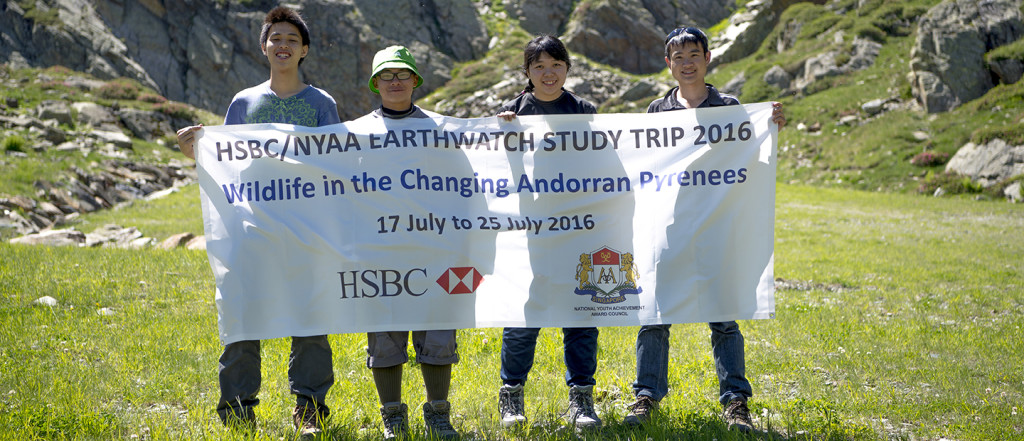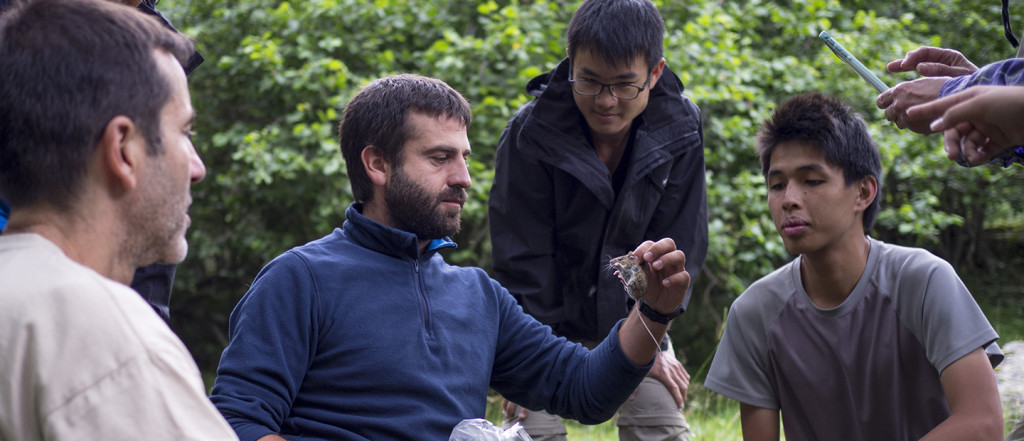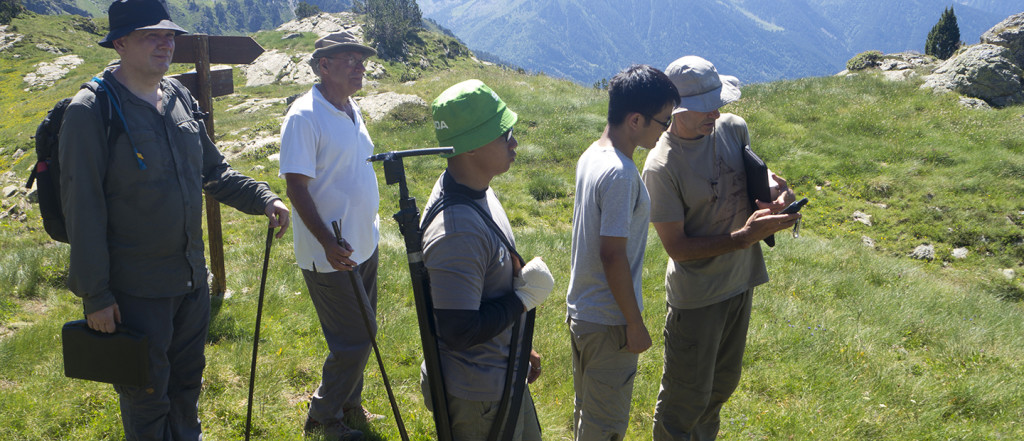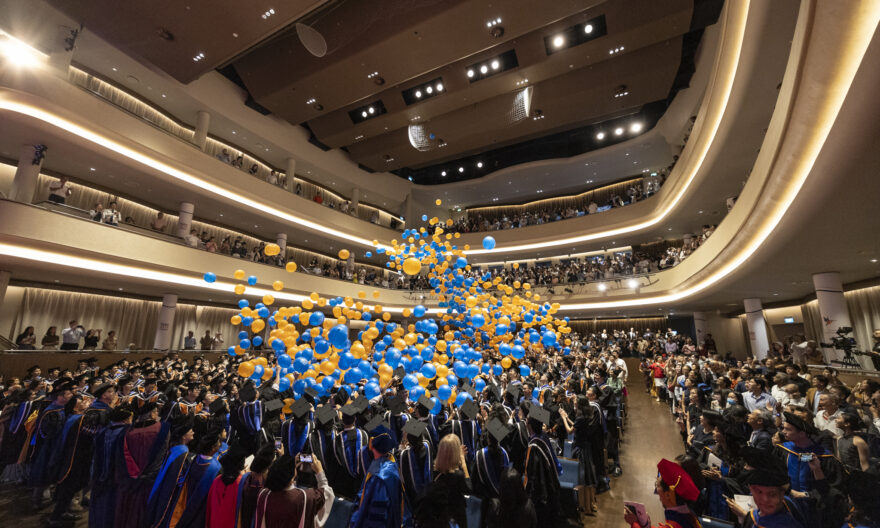Jeffrey Tong (Class of 2018) conducts environmental research with Earthwatch in the Andorran Pyrenees
 Jeffrey Tong (first from right) with fellow youth environmental activists in Andorran Pyreness
Jeffrey Tong (first from right) with fellow youth environmental activists in Andorran Pyreness
Between 17 and 25 July 2016, Jeffrey Tong (Class of 2018) would wake up every morning at 7.30am before setting out into the wilderness of the Andorran Pyrenees for a research expedition with 13 other people, including high school Biology teachers from the US, a retired professor of electrical engineering, and an 83-year old oncologist.
The expedition was organised by Earthwatch Institute, an international environmental charity, which seeks to engage people worldwide in scientific field research and education to promote the understanding and action necessary for a sustainable environment.
This trip, sponsored by HSBC, was part of the annual HSBC/NYAA (National Youth Achievement Award) Youth Environmental Award that Jeffrey received earlier in April 2016. Launched in 1998, the award aims to recognise young people between the ages of 14 and 25 for their environmental contributions in Singapore. It also comes with a $500 book voucher.
The award recognised Jeffrey’s work in driving sustainable development and environmental activism. Jeffrey is the Vice-President of I’dECO, a Yale-NUS student organisation that nurtures future leaders in environmental activism, and a Youth Fellow on climate change with the advocacy group Environmental Challenge Organization (ECO) Singapore. His experiences had also led him to further his expertise in a five-week environmental leadership programme in the United States under the US Department of State’s Young Southeast Asian Leaders Initiative (YSEALI) in 2015, where he co-founded Chili Padi Academy, a transnational environmental education and leadership accelerator programme for senior high school students in the region.
Jeffrey was on the Wildlife in the Changing Andorran Pyrenees expedition, organised by Earthwatch, which sought to study the impact of climate change in the mountain environment. The mountains act as environmental sentinels to detect the effects of global change in natural communities.

“The objective of the project is to measure and detail the changes to wildlife in the Andorran Pyrenees in response to climate change over a long period of time (more than 10 years). To do so, several experiments have been designed, and these include seven key areas such as observing the species abundance of mammals, birds and insects using different experimental methods as well as tree diameter growth over time through the use of dendrometers,” explained Jeffrey.

The mornings typically involve strenuous and extended periods of hiking on uneven terrain, ascending and descending slopes at high elevations in the Andorran mountains of over 2000m.
“We begin the day with setting up field experiments at six of twelve project sites established for the expedition. We resume after a lunch picnic but the afternoons are focused on observing and recording data that has been the result of previous expeditions and fieldwork on the same study sites.”
“We will also have special lectures in the evening, with topics that range from the Science of Climate Change, to the Ethnobotany & Ethnomycology of Plants and Mushrooms, to the Operations of a Ski Resort. These are either delivered by the lead researchers of the project or guest speakers from organisations in Andorra,” explained Jeffrey.
His most memorable experience was his ascent to the snowbed at an elevation of around 2500m.
“When we arrived at the snowbed, we were tasked to identify plant species on several marked plots on the ground. These plants indeed looked like typical grasses that you would walk and trample on, but the fact that you could identify dozens of plant species and their degrees of flowering in a single square meter plot was fascinating.”
“I watched in amazement at how our lead researcher lay belly-flat on the ground and started identifying plants by their scientific (Latin) name. By the time we were done after a few hours, I could already list a couple of species by scientific names off the top of my head! It still amazes me that there is so much depth in nature that often goes unnoticed.”
As an Environmental Studies major, participating in this expedition has allowed Jeffrey a hands-on experience of the research process. .
“This trip has introduced me to, and allowed me to experience in detail, the processes of scientific research in environmental studies that will very much inform the work of decision makers and the scientific community in order to address the problems that we currently face.”
The expedition has also helped to strengthened Jeffrey’s convictions on the importance of holistic and interdisciplinary education.
“Our education should not be solely confined to the boundaries that we ourselves create. Just as how a researcher shared about the abundance of undocumented indigenous knowledge regarding the use of medicinal herbs and fungi in his field of ethnobotany, there are so many connections across disciplines that we can observe out in the field. Environmental studies, in particular, encourages us to explore the interconnections among traditional disciplines, focusing on both theory and application.”
“My hope is for our education system in Singapore to adopt more of such holistic, hands-on approaches to learning and it’s a great thing that we are currently working on that at Yale-NUS College,” Jeffrey shared.
Yale-NUS offers 14 majors, and Environmental Studies is one of the interdisciplinary programmes offered by the College. One unique aspect of a Yale-NUS education is the broad-based multi-disciplinary curriculum, which allows students to delve into topics across the natural and social sciences, humanities and the arts.





